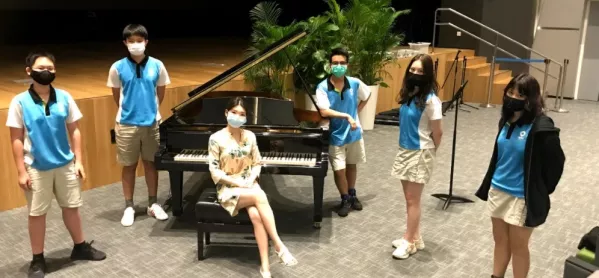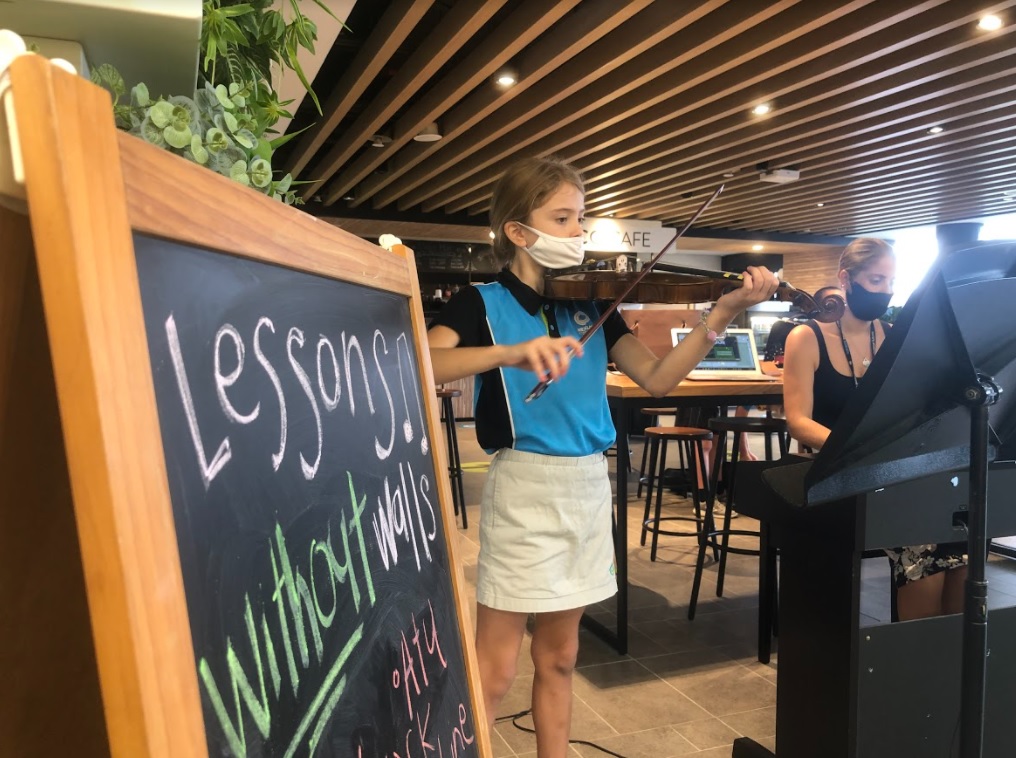Coronavirus: 7 ways we’ve kept the joy of music alive

Hand sanitiser, masks, social distancing and no singing - not exactly what springs to mind when we think of school music programmes.
Yet, across the globe, music educators (and musicians) are challenged by pandemic restrictions that have required some creative thinking.
Here at Nexus International School (Singapore) we have managed to do just that though, to allow our students to enjoy their musical journey, adapt to a new style of “performance” and involve parents to give them the support they need.
Coronavirus: Keeping school music going
Here are some examples of how we have done it:
1. Music ensembles
In pre-Covid times, we would offer an array of music ensembles differentiated by abilities and ages. Due to government guidelines, though, learners cannot mix across year groups, group sizes are limited and no wind instruments are allowed.
As such, we have worked to offer a variety of ensembles catering for all levels in every year group, continuing to include wind players by sending them parts home to rehearse, and rearranging pieces accordingly.
This has been a lot of extra work and organisation but it ensures that the students are still able to create music together.
Over time, restrictions have eased and we are now allowed a maximum of five wind players at any one time, which has enhanced the ensembles and ensured that more learners are able to participate.
2. Singing - for everyone
In Singapore singing is restricted, therefore our usual choirs have not taken place.
However, we decided to offer a virtual choir, with the twist of including everyone and anyone from our community.
Live online rehearsals saw the whole school community come together, as families were singing with each other and joining in the fun from their homes.
3. Recitals still went ahead
We began with students performing and videoing themselves at home and we then compiled these clips into online recitals, which were shared with parents.
This also has the added bonus of enabling families to watch from overseas and opened up our music to a wider audience.
As restrictions eased, we invited our young musicians to record themselves in our auditorium, which provides a more formal performance setting for our students.

4. Masterclasses and workshops
As an alternative to large-scale concerts, we invite highly skilled musicians and educators to work alongside our musicians through workshops and masterclasses in school, enhancing and supporting learning - for example, piano masterclass, to songwriting and production.
We are still looking for more opportunities to offer and next term we will invite our singers to have recording sessions in our music studio.
5. A (not so) live audience
To maintain the usual “buzz” of music that is normally felt around our school campus, we bring our learning outside of the classroom.
At Nexus you may find a Year 8 samba lesson taking a walking carnival around the school field, Bhangra drumming being led by our teachers at the school entrance, or guitar ensemble rehearsals by the Christmas tree.
Additionally, our instrumental tutors host lessons in the morning before school at various stations. There is no better way to start your day!
Although no clapping or audiences are allowed, these open rehearsals allow our students to still experience performing while the tutors are on hand to provide reflections and advice on performing etiquette.
6. Christmas joy
With no parents allowed on to our school campus, we have decided to provide our community with a selection of carols led by our musicians from across the school. Our carols this year is a compilation of music videos by the current Nexus ensembles as well as some class performances.
Each performance is recorded in various locations around the school and individual singers for the choirs are recorded in our music studio. All of the above provided a window into the classroom experience for our families.
7. Social media sharing
We always share our music via social media and online learning but as it is now one of the only ways that parents can enjoy their children’s hard work, we have found that viewings have increased considerably.
Parents enjoy seeing their children’s learning and - as mentioned - are now able to be part of it with our virtual choir, and so can join in with this as a family.
The most important thing for me, as a music educator, has been to keep music alive within our community.
By following and adapting to guidelines, it has challenged our creativity, which has, in turn, created new, innovative ways of making and sharing music, some of which we will continue to use after normality returns.
Working in the arts is about being creative and passionate in what you do, and we hope that our Nexus music department has done just that.
Clare Lambert is head of music at Nexus International School in Singapore
Register with Tes and you can read two free articles every month plus you'll have access to our range of award-winning newsletters.
Keep reading with our special offer!
You’ve reached your limit of free articles this month.
- Unlimited access to all Tes magazine content
- Save your favourite articles and gift them to your colleagues
- Exclusive subscriber-only stories
- Over 200,000 archived articles
- Unlimited access to all Tes magazine content
- Save your favourite articles and gift them to your colleagues
- Exclusive subscriber-only stories
- Over 200,000 archived articles